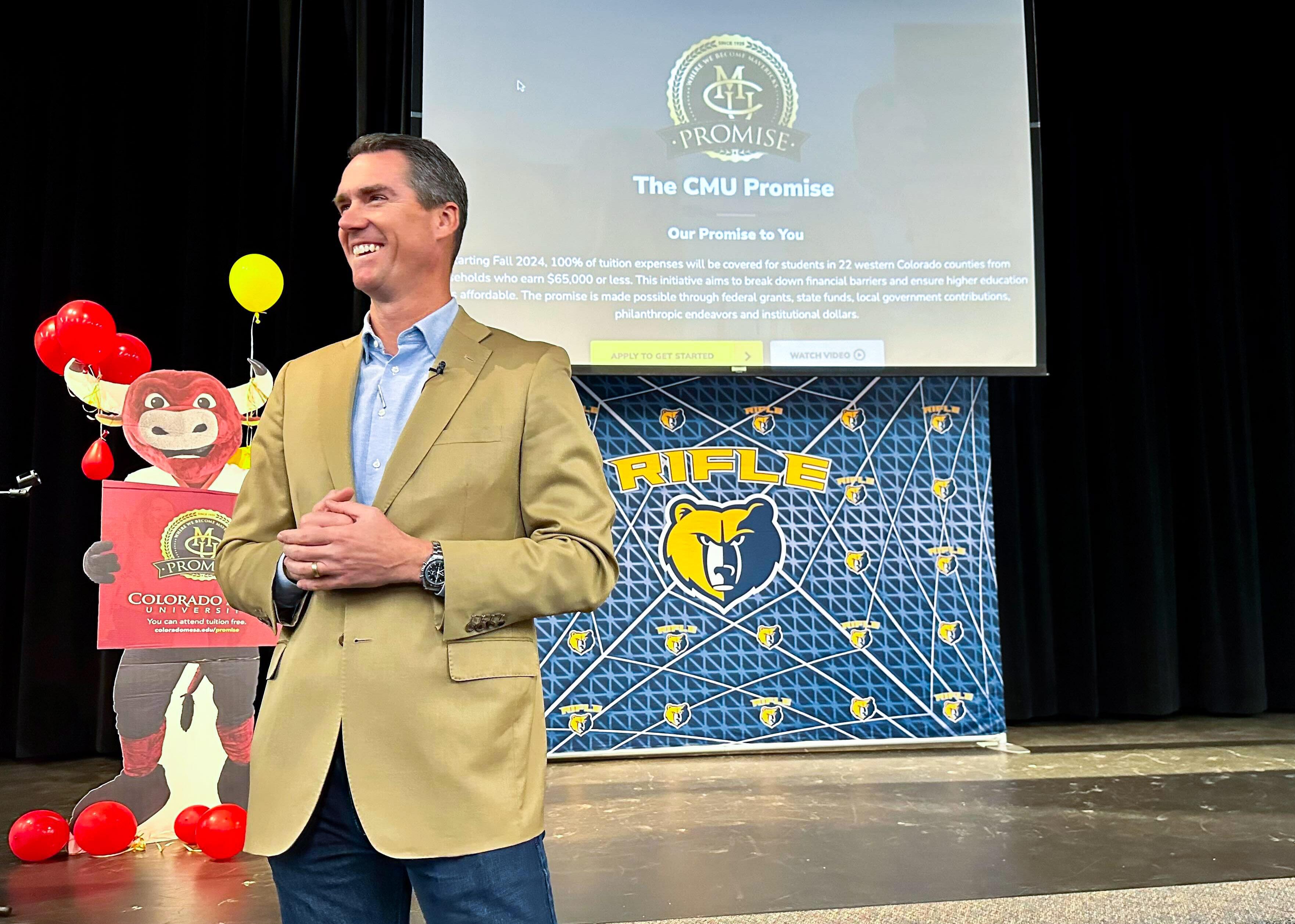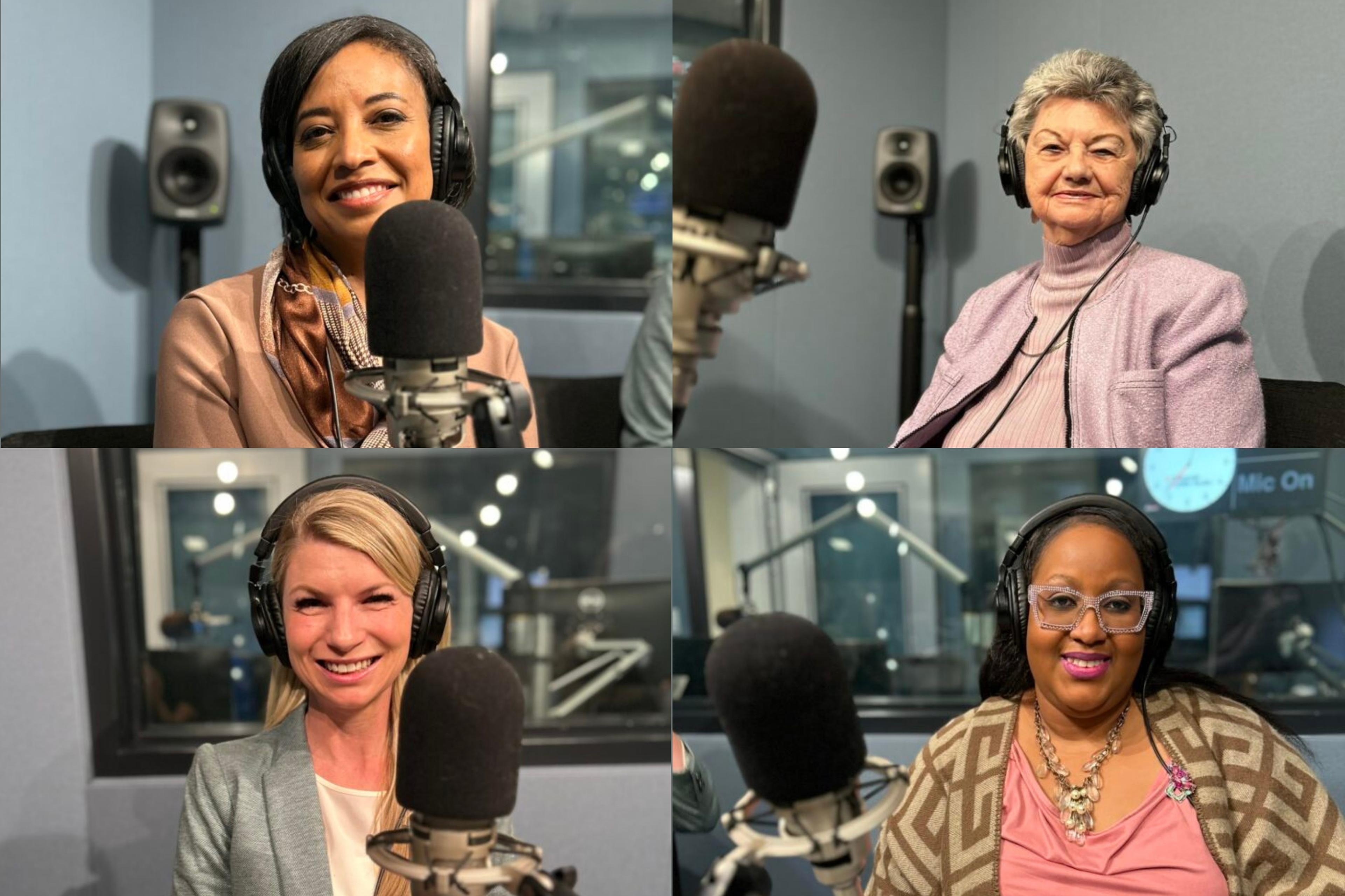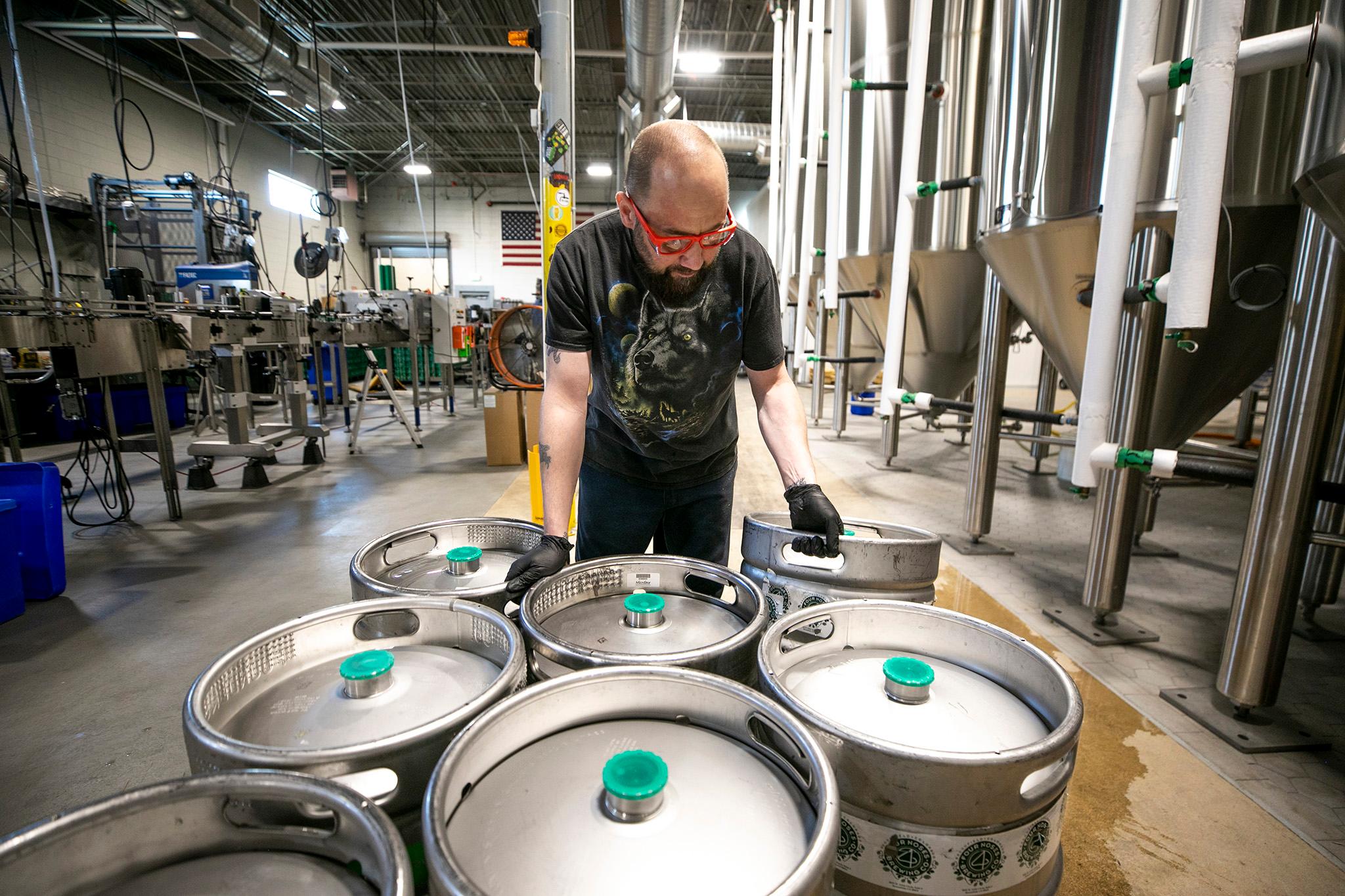
As presidential hopefuls Donald Trump and Bernie Sanders barnstorm the country, both take frequent aim at the same perceived enemy: international trade, and the deals the candidates say are hurting America’s working class and the nation’s overall economy.
It's a message that resonates differently around the country. Colorado is not Michigan or Ohio, but trade has definitely affected business here, too. As a part of NPR’s A Nation Engaged project, CPR looked into how this issue affects Colorado. Here are stories of some of the people at its heart.
What The Numbers Say
More than 5,700 Colorado companies sell their goods or services overseas, according to the state’s Office of Economic Development and International Trade, and most of them are small-to-mid-sized companies, those with less than 500 employees.
Colorado’s biggest trading partners are countries covered by past or pending free trade deals. One third of the state’s exports go to NAFTA countries – Mexico and Canada. Nearly half of what Colorado sells abroad goes to countries covered by the Trans-Pacific Partnership deal.
All this trade breeds a more resilient economy, according to Stephanie Dybsky, an international business manager in the Trade Office.
"We're not only competing with one another, but now we're competing with companies from all over the world," she says. "That encourages and almost requires our companies to innovate."
As with the rest of the country, the manufacturing sector has taken a steep hit in Colorado in recent decades, with the lowering of trade barriers to Mexico, China, and other developing nations.
The state went from a high of 189,000 manufacturing jobs in 2000 to a low of 123,000 in 2010. That number has rebounded a bit in recent years. But what Colorado makes, and how, has changed a lot.
The Exporter: ThinkLabs Medical
Computer and electronics manufacturing make up the single most valuable slice of Colorado’s exports. Many of these count as “advanced manufacturing,” and have more to do with clean rooms than factory floors.
If you want an example, ThinkLabs Medical in Centennial is a good place to visit.
The production facility for this maker of high-end electronic stethoscopes sits right in the middle of its small office suit. A row of small 3-D printers sculpt the product’s shell from hot plastic. Two women nearby carefully fit components together.
Clive Smith originally manufactured his stethoscope overseas, in China. But two years ago he decided to build them in-house, to have more control over quality and to speed up innovation.
“We can discover that something's happening and we think we can improve it, we can have a round table discussion and we can change it that day,” Smith says.
The price of ThinkLabs' stethoscopes doubled when production came back to the U.S. But the product improved too, Smith says, and customers were willing to pay. He’s found Colorado a relatively easy place to grow. ThinkLabs currently has about 10 employees, and all of them have at least a college degree.
“We have an educated population. And when you’re making a sophisticated product, the availability of educated people is really a big benefit,” Smith says.
ThinkLabs’ current challenge is how to navigate international regulations that keep the company from selling more overseas. The stethoscope already has FDA approval but Smith is now seeking a CE mark, which is necessary to sell in Europe and much of the rest of the world.
The criteria for both certifications are fairly similar, but the paperwork and other bureaucratic barriers make getting them costly and time consuming. Two big trade deals in the works – the Trans-Pacific Partnership, or TPP, and the forthcoming Trans-Atlantic Trade and Investment Partnership, or T-TIP – could have a big impact on that.
“Those agreements have got the potential to make it much more seamless,” says Smith. “Once you have approval for a medical device, it's essentially going to be covering many, many countries.”
And that could be a big deal for ThinkLabs; Smith estimates his sales could triple once he’s approved for international sales.
The Exporter: Bledsoe Cattle Company
Grant Bledsoe’s feedlot in Yuma County is one of those quintessential Colorado places: dusty pens lot packed with wary-eyed calves, surrounded by empty, rolling prairie.
But the animals he raises here have a future that stretches far beyond the state. Their innards will likely to go to Mexico. Their diaphragm muscles could end up in Asia. Their hides may be tanned into leather in China, and then shipped back to become car seats and other goods.
“We've been kind of depending on that export market here for the last several years,” Bledsoe says, “when the supplies of cattle have been tight and the world economy has been on the rise, we've see a huge benefit.”
Bledsoe estimates that the international market can add $300-$700 in value to each animal. And that's sometimes the difference between a profit and a loss.
This year Colorado cattle producers are struggling; a strong dollar and low commodity prices are hurting the bottom line. The pending TPP could be a big boon, by lowering tariffs on imports to Japan, a big beef consumer, and making American producers more competitive against Australia.
Casualty: T-Mobile Workers

Venice Romero and Vanessa Abdurahman became friends not long after they both started working at a T-Mobile call center in Thornton, in the early 2000s. For years the two women climbed the ranks, eventually making around $24 an hour.
It was good work, until the spring of 2014, when rumors started flying that their jobs would be moving overseas.
“We got an email that said, ‘Everybody log off at the exact same time,’” Romero remembers. “And when we got that I turned around and I joked to my supervisor and said, ‘Get ready to get laid off.’”
She was right. The center was moving to the Philippines. Abdurahman says the experience was devastating.
“I was a single mom. I have three sons. I was taking care of my dying mother,” she says. “I didn't go to college, so I thought, what am I going to do, how am I going to take care of my family? I was physically sick, emotionally sick. It was horrible. I had no clue what I was going to do."
What Abdurahman and Romero decide to do was take advantage of the Trade Adjustment Assistance program, a federal effort that pays for up to two years of education for people who've lost their jobs to off-shoring. According to the state’s Department of Labor, 4504 Coloradans have gone back to school through the TAA in the past 15 years.
The friends decided to get certified as respiratory technicians; in part because those are jobs that can't be sent overseas. But it wasn't easy. Abdurahman remembers crying silently through many of her early classes.
“It was overwhelming to say the least,” she says.
The women now work at Saint Joseph's hospital together, making close to what they did at their old jobs. The transition required years of struggle, but the friends are surprisingly positive about what they’ve been through.
"I like my job a heck of a lot more. It's a lot easier to go to work than it ever was working in a call center," says Romero. Adurahman joins in: "Oh for sure. Once I'm at work I literally look forward to my day."
This is how boosters of free trade say it's supposed to work -- low-skill, low-paying jobs move overseas and are replaced by higher-skill, higher-wage work here at home.

But the Trade Adjustment Assistance program has plenty of critics. For one thing it only helps a fraction of the people who lose their jobs to trade. Many more never benefit. Some can't afford to survive on unemployment insurance while they go to school. Others live in economically depressed areas with few available jobs at which to use their new skills. And for older workers, starting over in a new career is often just too daunting.
That's how Bob Knapp of Denver felt. He was laid off by Samsonite after 40 years with the company, when the luggage-maker moved its Colorado facility to Mexico.
“I figured if I took two years of schooling, I'd be a 62-year-old and I didn't figure I was marketable,” Knapp says.
Instead he and his wife tightened their belts for a few years until he could start drawing Social Security.
Knapp says he's the kind of guy who works hard to make sure the things he buys were made in America, from his clothes to his car. But it's not easy. It’s something he thinks about whenever he takes the long drive back to his home town in Nebraska.
"You would see those unnumbered tolls of trains coming in with nothing but boxcars of foreign goods," he says. "And you turn around and go into a store to [buy] an American something, it's hard to do any more."
Resistance: Environmental Activists

Tariffs and foreign competition are only one aspect of the massive trade deals in the works right now. Perhaps as important, and controversial, are the way these agreements can re-shape regulations in the countries that sign onto them.
That’s in part why the environmental community has been one of the loudest voices opposing the TPP and T-TIP.
“We at Food and Water Watch believe the Trans-Pacific Partnership will undermine our food safety regulations, will mean more fracking next to homes and schools here in Colorado, and will erode our local democratic decision-making policy when it comes to our food and water,” says the group's Sam Schabacker.
Here’s what’s Schabacker says is most worrysome:
- The TPP encourages countries to use private food inspectors, instead of government ones. And it would allow foreign food producers to challenge domestic food safety regulations.
- It would make it easier for oil and gas companies to build export terminals, increasing the international demand for natural gas from North America and leading to more drilling along Colorado’s gas-rich Front Range.
- The TPP would also allow foreign companies to challenge local environmental regulations, if those measures cut into the company's profits.
In Colorado, the state has already taken local governments like Longmont to court over fracking bans. With the TPP, multi-national companies could get in on the game too, suing in a special trade tribunal. That's already the policy under NAFTA and Schabacker says companies do use it. He points to a U.S. oil and gas firm that recently went after Quebec.
“Because the province put a moratorium on fracking, this company sued the province of Quebec for $200 million in damages,” he says.
But boosters of international trade deals -- like Colorado Gov. John Hickenlooper -- dismiss that fear as overblown.
Hickenlooper believes Colorado stands to gain much more than it might lose under pending trade deals. And he's not happy with what he's been hearing from some of the presidential candidates.
“To be blunt, I am concerned. I'm not saying that we shouldn't be protecting jobs in Colorado, making sure the system is fair,” Hickenlooper said. “But commerce between two countries, throughout history, has always, has almost always, led to improving quality of life on both sides.”
The Fall and Rise of An Industry: Textiles
Unlike the industrial cities of the Rust Belt, it’s hard to point to a part of Colorado and blame its hardships on fleeing factories. But Pueblo and the Eastern Plains have been hit hard. In Pueblo right now hundreds of steelworkers are currently out of work, a situation some blame in part on China dumping cheap steel on the international market.
In the past few decades, entire industries have left so the state thoroughly that it's hard to remember they were even here. One example: textile manufacturing.
"You could go all the way east down the Arkansas River, all the way into Kansas... there was a factory in every little town," recalls Jack Makovsky, with Ralph’s Industrial Sewing Machine Company in Denver. Makovsky has worked in Colorado's textile industry since the 1970s. "There was sports, business, there was pajamas, there were dresses. There was skiwear. A lot of that."
Makovsky says those facilities started moving overseas in the 1980s, to China, Mexico, and the Caribbean. But in the past few years he's seen a few signs of hope: The demand is growing for specialty sewing stateside.
"You're not any more, in this country, going to be making the 1,000-man shop. But people that have stuff that are more expensive, more styled, more creative-type things, you'll see a lot of that happening," says Makovsky.
One place hoping to meet that need is the Rural Colorado Apparel Manufacturing center in the small town of Wray near the Nebraska border.
Private investors opened the cut-and-sew shop earlier this year and now part-time workers sit at its half-dozen high-tech sewing machines, stitching bags and other small-batch products.
"It doesn't really make sense to send this overseas, to send it to China or Bangladesh," says Darlene Carpio, executive director of the Yuma County Economic Development Corporation, which helped get the idea off the ground. "[designers] want to get it made at home. And what they were finding out very quickly is that resource for production is very limited here."
Making clothing in Colorado is going to cost more than overseas, but Carpio sees hope in other buy-local movements; she hopes to consumers will be willing to extend their demand for farm-to-table products to include workshop-to-closet.
"I think if we can put that story out there, that you are supporting jobs right here at home, you're supporting skills here at home, I think the consumer will be supportive of that," says Carpio.
If the Wray center succeeds, economic development directors across the Plains are hoping to replicate it. And many economists would argue that one reason Colorado consumers can afford to pay a bit more for made in Colorado apparel is because trade has lowered the cost of most other consumer goods. All those cheap electronics from China may leave more money in people's pockets to buy a few local clothes.









